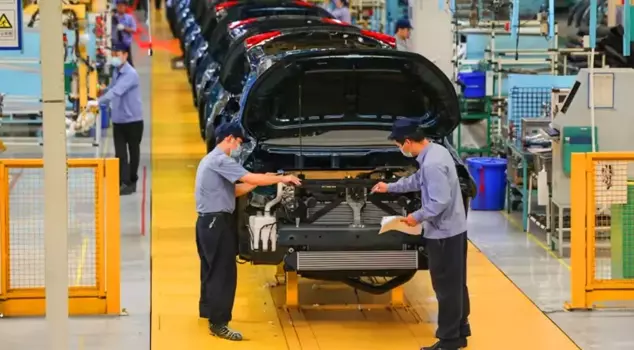
09.01.2025 15:25
The German automotive industry entered a deeper crisis with the business environment index dropping from minus 32.4 points in November 2024 to minus 34.7 points in December 2024. Companies are also experiencing a decline in employment expectations, do not find their production capacities sufficient, and export expectations are being negatively affected.
The sensitivity of German automotive manufacturers and suppliers significantly worsened due to a backlog of orders at the end of last year.
According to the results of the Ifo Business Climate Survey conducted by the Munich-based Institute for Economic Research, the business climate index of the German automotive sector, which was minus 32.4 points in November 2024, fell by 2.3 points to minus 34.7 points in December 2024.
The current situation index of the German automotive sector also increased by 1.5 points to minus 32.3 points in December 2024.
The sector's business expectations for the coming months declined from minus 30.9 points to minus 37.1 points.
The statement regarding the survey noted, "The mood in the German automotive sector worsened further by the end of 2024."
It was stated that companies evaluated their current business conditions slightly better in December compared to November, but they were more pessimistic about the coming months.
EXPORT EXPECTATIONS HAVE DECLINED
The statement said, "Many companies in the automotive sector assessed their order backlogs as insufficient to fully utilize their production capacities. No positive momentum is expected in foreign trade. Export expectations fell from minus 19.1 points in November to minus 20.3 points." It was noted that the downward trend in the sector in recent months also continued in terms of hiring. Companies' employment expectations decreased from minus 33.9 points in November 2024 to minus 36.7 points.
THE DOWNWARD TREND IN THE SECTOR AFFECTS EMPLOYMENT EXPECTATIONS
Anita Wölfl, an expert at the Ifo Center for Industrial Organization and New Technologies, commented on the issue, stating, "The automotive industry has thus entered a deeper crisis. More companies are considering layoffs compared to the past."
THE EUROPEAN AUTOMOTIVE SECTOR FACES MANY CHALLENGES
German automotive manufacturers are under serious pressure to reduce costs and maintain competitiveness in light of weak demand from China and Europe while battling the high costs of transitioning to electric vehicles. The fact that groundbreaking technologies in the automotive industry have come from China and the US in recent years has become a topic of discussion in the European public, while the increasing competition from Chinese manufacturers and Volkswagen's historic layoff and factory closure plans have intensified these discussions.
VOLKSWAGEN'S HISTORIC DECISION DEEPENS THE CRISIS
Volkswagen's decision deepens the crisis faced by the German automotive industry, as the automotive sector is losing its competitiveness in the country due to high tax rates, rising electricity prices, and extensive bureaucracy. Europe's largest car manufacturer, Volkswagen, has reached an agreement with the works council and unions to lay off 35,000 people in Germany and reduce capacity.
TRUMP'S TARIFF POLICY MAY AFFECT EUROPE
Additionally, Donald Trump, who will be sworn in as President of the United States again this month, has stated that if he wins the election, he will significantly increase tariffs to reduce the trade deficit and support domestic production. Trump wants to impose a 10% or 20% tariff on all imports from the EU.
THE GERMAN ECONOMY REMAINS VULNERABLE
The German economy remains vulnerable due to persistent weakness in the manufacturing sector, which plays a larger role compared to other countries in the region. The country's economy contracted by 0.3% in the second quarter of last year but managed to grow by 0.2% in the third quarter, avoiding a technical recession. The crisis in the German automotive industry has emerged from a complex interaction of overlooked trends, structural problems, and geopolitical risks, while the automotive industry once formed the backbone of the German economy. The sector accounts for 5% of the total value added in Germany and provides 3% of employment. In terms of revenue, it is by far the largest industrial sector. German automotive manufacturers exported goods worth 272.6 billion euros last year, which corresponds to 17.3% of total exports.
PRODUCTION SHORTAGES REFLECT ON EMPLOYMENT
As of June 2024, approximately 773,000 people were employed in the German automotive sector, excluding suppliers, while employment in the sector decreased by 0.8% compared to 2023. About 14% of workers in the industry are in the automotive sector, making it the second largest industrial sector in terms of workforce after mechanical engineering, which has 952,000 employees. If Germany shrinks in 2024, it will be the only country among the G7 economies to contract, just like in 2023.